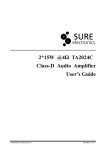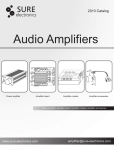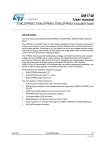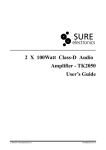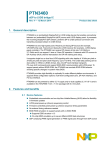Download 2*100 watt @ 4ohm TK2050 Class-D Audio Amplifier
Transcript
2*100 watt @ 4ohm TK2050 Class-D Audio Amplifier Board User’s Guide © 2004-2009 Sure Electronics Inc. AA-AB013_Ver1.2 2*100 WATT@4OHM TK2050 CLASS-D AUDIO AMPLIFIER BOARD USER’S GUIDE Table of Contents Chapter1.Overview ......................................................................................................................... 1 1.1 Welcome ......................................................................................................................... 1 1.2 Quick Start...................................................................................................................... 3 Chapter2.Hardware Detail .............................................................................................................. 5 2.1 Power Connection ......................................................................................................... 5 2.2 Input Connections ......................................................................................................... 5 2.3 Output Connections ...................................................................................................... 5 2.4 Connection with Next Board......................................................................................... 6 2.5 Mute Setting ................................................................................................................... 6 2.6 Gain Settings.................................................................................................................. 6 2.7 DC Offset......................................................................................................................... 6 2.8 LED Indicators ............................................................................................................... 7 2.9 Volume Control............................................................................................................... 7 Chapter3.Electrical Characteristics .............................................................................................. 8 Chapter4.Mechanical Drawing....................................................................................................... 9 Chapter5.Appendix ....................................................................................................................... 10 Schematics ............................................................................................................................. 10 Chapter6.Contact Us..................................................................................................................... 12 2004-2009 Sure Electronics Inc. AA-AB013_Ver1.2_Page i 2*100 watt @4ohm TK2050 Class-D Audio Amplifier Board NOTES: Product Version : Ver 1.0 Document Version : Ver 1.2 AA-AB013_Ver1.2_Page ii © 2004-2009 Sure Electronics Inc. 2*100 WATT@4OHM TK2050 CLASS-D AUDIO AMPLIFIER BOARD USER’S GUIDE Chapter1.Overview 1.1 Welcome This self-made 2*100W audio amplifier board is a perfect class-D architecture integrated with Tripath TC2000 and TP2050. It supports dual channel amplification and can readily be powered by any DC power supply ranging from +10 to 36V. You can use it to drive any 4Ω or 8Ω passive speakers. As quoted from the datasheet of Tripath, TC2000 is a two-channel audio controller that uses Tripath’s proprietary Digital Power Processing (DPPTM) technology. When combined with switching power output stages, the TC2000 allows the implementation of a complete Class-T audio amplifier. TP2050 is a stereo power stage capable of 50W continuous average power per channel, Class-T Digital Audio Power Amplifier using Tripath’s proprietary Digital Power ProcessingTM technology. The TP2050 can be coupled with a Class-T controller such as TC2000 or TC2001 to produce a high-quality stereo amplifier. To put it simple, TC2000 converts analogue audio signal it receives into digital signal and TP2050 amplifies the digital signal from TC2000. This amplifier board integrates two TP2050 chips to support dual channel amplification of up to 100W each. The absolute maximum voltage of TP2050 chip is rated at 40V, so 36V is the very maximum recommended rail voltage. The maximum voltage of TC2000 shall not exceed 5V. Figure 1 Product Diagram Notice: The diagram above is used for reference only. © 2004-2009 Sure Electronics Inc. AA-AB013_Ver1.2_Page 1 Overview Features: y Fully bridged stereo output, the output of this product cannot be bridged again. y Maximum voltage of power supply is 36V y Line level analogue audio input y Sensitivity and gain are adjustable with on-board DIP switch y +5V screw terminal for mute y Over / under voltage turn off y Over current protection y Over temperature protection Applications y Powered Subwoofers y Home Theater Receivers y Multi-channel Distribution y Powered DVD Systems y Mini/Micro Systems Benefits y Mounting holes are available for easy installation and fix y Several wiring methods facilitate connection y The design of power supply allows you to connect more amplifier boards. y Excellent heat sink eliminates your worry over heat dissipation. AA-AB013_Ver1.2_Page 2 © 2004-2009 Sure Electronics Inc. Overview and Main Feature 1.2 Quick Start Suggested connection is shown in Figure 2. Figure 2 Connection Schematic Notice: Please observe the following steps to complete verification so as to ensure the products are intact during transit. 1. Open the amplifier package and make sure the product is intact (No missing or damaged components and no deformation) 2. Please observe the connection diagram when connecting the amplifier board. Use a nearby sound source, such as MP3 or CD player to have a trial. This amplifier board can be deemed as qualified if you can hear the sound correspond to that sound source. © 2004-2009 Sure Electronics Inc. AA-AB013_Ver1.2_Page 3 Overview Figure 3 Cascade Schematic Notes: 1. GND should be connected to ground or the housing of your instrument. 2. Never connect “OUT1-” and “OUT2-“since they are not in the same net. AA-AB013_Ver1.2_Page 4 © 2004-2009 Sure Electronics Inc. 2*100 WATT@4OHM TK2050 CLASS-D AUDIO AMPLIFIER BOARD USER’S GUIDE Chapter2.Hardware Detail 2.1 Power Connection To power the amplifier board, use either jack or terminal blocks. On-board diodes can prevent the consequence of wrong connection of power supply. Connector Mark Description Jack J3 Terminal Blocks J1 J5 DC 10-36V Power Supply VCC GND Positive (+) of DC 10-36V Power Supply Negative (GND) of DC 10-36V Power Supply Warning: You are allowed to use only one way for powering the amplifier board at a time. The maximum voltage of power supply shall not exceed 36V. 2.2 Input Connections You may use either RCA connectors or terminal blocks to input audio signal. Connector Mark RCA Connectors Terminal Blocks J7 J9 J8(PIN1) J8(PIN3) Channel Channel 1 Input Channel 2 Input Channel 1 Input Channel 2 Input Warning: You are allowed to feed only one group (dual channel) of audio signal to the amplifier board at a time. Please refer to 2.6 “Gain Setting” for details. 2.3 Output Connections You can use either terminal blocks or banana connectors to output audio signal. Two pairs of banana connectors are provided for free. Connector Mark Banana Connectors Terminal Blocks Refer to on-board descriptions for connection details J10 J12 J15 J13 J11 J14 Description Positive output of Channel 1 Negative output of Channel 1 Positive output of Channel 2 Negative output of Channel 2 Output of Channel 1 Output of Channel 2 Warning: Never connect more than one group of speaker to the audio output. © 2004-2009 Sure Electronics Inc. AA-AB013_Ver1.2_Page 5 Hardware Detail 2.4 Connection with Next board J4 and J2 on terminal block are used to connect more amplifier board. Connector Mark J4 VDD J2 GND Notice: Description Positive (+) of DC 10-36V Power Supply to next board Negative (GND) of DC 10-36V Power Supply to next board It is allowed to connect more amplifier boards in series, but it would be better to limit that number to 4. Remember to use AWG12-compliant cable or equivalent for series connection. 2.5 Mute Setting To mute the output audio signal, connect “+5V” and “MUTE” of the terminal block with a piece of lead. In normal use, “MUTE” shall be left unconnected. Connector Mark J6 MUTE Description When “MUTE” is connected with “+5V”, both amplifiers will be muted and enter into idle mode. When connected to ground or left disconnected, both amplifiers will resume to regular operation. Notice: When you select power supply for the board, the appropriate voltage is DC 10-36V. Never connect "MUTE" on the terminal block to any power supply or any other voltage higher than 5V. 2.6 Gain Settings The on-board 4-slide DIP switch, which is marked as “SW1”, is used to set the gain of amplifier board. 4 slides are marked as K1, K2, K3 and K4 respectively. K1 and K2 are used to set the gain of channel 1 while K3 and K4 are used for channel 2. The following table lists the gain values on different settings: Channel 1 Setting K1 K2 ON OFF ON OFF ON ON OFF OFF Channel 2 Setting K3 K4 ON OFF ON OFF ON ON OFF OFF Gain Level High Medium Medium Low Amplifier Gain Power Gain (dB) Voltage Gain (V/V) Typical Typical 24 16 30 32 30 32 34 48 Tips: High: Portable MP3/CD player with built-in volume control. Medium: General-purpose use Low: Preamplifier with fairly high output signal 2.7 DC Offset If it is not quite necessary, DO NOT trim the output offset by adjusting “R5” and”R26”-two AA-AB013_Ver1.2_Page 6 © 2004-2009 Sure Electronics Inc. Hardware Detail potentiometers on board since we have already regulated that offset to a range of +/- 10mV. You may refer to the connection diagram for the location of potentiometers. Warning: Adjusting these potentiometers may damage your speakers. 2.8 LED Indicators This amplifier board has two indicators, one of which is marked as “Power (D3)”; another is “Hmute (D4)”. The power indicator will be illuminated in green on power-up and “Hmute” will be illuminated in blue when you mute the amplifier audio output or amplifier board error occurs. Please refer to the TK2050 Data Sheet for a complete description of HMUTE. Please refer to the Board Connection Diagram for the LED locations on amplifier board. 2.9 Volume Control This amplifier board doesn’t include any potentiometer which could be used to manually adjust the volume control. Users may use the volume control of the sound source (such as MP3 player or PC) to adjust the loudness of the audio output. If you need a potentiometer, you may install one (50Kohm) by yourself, but it may void the warranty at the same time. Another reason for not installing potentiometer is the signal attenuation it may occur after installation. To compensate that attenuation, adjusting the gain value is required. You may refer to 2.6 Gain setting for details. Please be aware that audio clippings (waveform distortion) may occur for some portable players, these are the clippings generated by the audio source, not the amplifier itself; please increase the input gain of amplifier board. © 2004-2009 Sure Electronics Inc. AA-AB013_Ver1.2_Page 7 2*100 WATT@4OHM TK2050 CLASS-D AUDIO AMPLIFIER BOARD USER’S GUIDE Chapter3.Electrical Characteristics The following table lists all typical data. For full specifications, please refer to the Tripath data sheet of TK2050 chip. Supply voltage Over-current shutdown Signal/Noise Ratio THD+N Channel separation Efficiency Output power 4 ohm*@30V rail Output power 8 ohm*@30V rail Offset voltage Min 10V 7A Output noise Input impedance Power stage gain Thermal warning* Thermal shutdown* Notice: *The chip specifications by Tripath. AA-AB013_Ver1.2_Page 8 Typical 24V 12A Max 36V 16A 80dBA Not tested 95dB 85%-90% 75W<0.01THD+N, 115W 10% THD+N 35W<0.01THD+N, 60W 10% THD+N Adjustable below 100mV 135mV Nominally 22 to 47 K Set by dip switch 130ºC 150ºC © 2004-2009 Sure Electronics Inc. 2*100 WATT@4OHM TK2050 CLASS-D AUDIO AMPLIFIER BOARD USER’S GUIDE Chapter4.Mechanical Drawing Figure 4 Symbol Inch mm L 4.80 121.92 © 2004-2009 Sure Electronics Inc. L1 4.40 111.76 W 4.00 101.60 W1 3.60 91.44 AA-AB013_Ver1.2_Page 9 2*100 WATT@4OHM TK2050 CLASS-D AUDIO AMPLIFIER BOARD USER’S GUIDE Chapter5.Appendix Schematics VCC D1 SS34/DO-214AB 1 2 1 0.1uF/50V VOUT VOUT 2 4 1 C2 0.1uF/50V VIN + C3 C5 47uF/50V 0.1uF/50V R2 3K 2 1 + C4 R3 100uF/10V 1K R1 C6 1K 0.1uF/50V 2 CON2 C1 3 1 2 J2 +5V U1 LM317EMP/SOT-223 D2 SS34/DO-214AB 1 2 VADJ CON2 1 J1 22uF/33uF D3 2 CON2 VCC VCC 1 J4 VCC 1 LED/G DJ005B 1 2 3 1 J3 2 + C7 + C8 2 2 VCC VCC VCC 1 220uF/50V 1 220uF/50V 2 J5 C10 + C9 1 220uF/50V 1 VCC R4 0.22uF//MKP 0R CON2 2 VCC 1 + C11 +5V 1 MUTE 220uF/50V C14 + C13 220uF/50V 0.22uF//MKP 220uF/50V 2 2 + C12 2 CON2 2 J6 +5V 1 U2 R5 2 R6 470K 10K/EVM3ESX50B14 C15 R8 3 0.1uF/50V C16 0.22uf /MKP C17 1uF/50V CH1 Gain1A R11 22K 16 17 470K 18 19 +5V Gain1B 20 C18 0.1uF/50V 22K R16 22K CON3 1 CH1 SW1 Gain1A 2 3 1 2 3 4 Gain2A 8 7 6 5 R18 R19 R20 R21 22K 22K 22K 22K NC VLO Y2 OVRLDB VHI GND Y1 HUMTE 21 22 14 13 12 11 10 9 Y2 Y 2B Y 1B Y1 8 D4 7 V5 LED/B R12 1K R13 15K R15 C19 1K 390pF/50V VP1 IN1 FDBKP1 OUT1A R17 15K 6 OUT1B MUTE Gain2B C20 CH2 Y 2B FDBKN1 23 Gain1B OCD2 OCD1 +5V 1 J8 REF TC2000/SOIC Y 1B R10 22K R14 CH1 15 R9 10K 2 J7 R7 8.2K 1uF/50V R23 10K +5V SW DIP-4 24 MUTE R24 +5V VPWR 10K C21 1K 390pF/50V 5 R25 15K 4 OUT2A 1 FDBKN2 R22 R26 2 R27 470K 25 +5V 26 3 10K/EVM3ESX50B14 C23 R29 0.1uF/50V 470K 0.22uf /MKP C25 1uF/50V J9 2 CH2 Gain2A R32 22K Gain2B BBM1 DCMP R30 22K C24 BBM2 27 28 VP2 IN2 FDBKP2 BIASCAP 3 R28 C22 1K 390pF/50V R31 15K 2 OUT2B 1 C26 R33 C27 0.1uF/50V 1K 390pF/50V R34 1 CH2 AA-AB013_Ver1.2_Page 10 22K © 2004-2009 Sure Electronics Inc. Appendix +5v U3 Y1 29 23 24 R35 IBIAS OUT1A1 CONFIG OUT1A2 OUT1A 16 C29 6.8uF/50V C30 VCC 0.1uF/50V 27 26 C31 +5V 14 0.1uF/50V Y1 28 30 FAULT VCC1B TRISTATE TH_WAR OUT1B1 OUT1B2 IN1B GND1B R37 18 10K Y1B 31 21 22 33 34 12 L1 11 10 C39 0.1uF/50V 0.1uF/50V 35 36 C40 20 Y1B 32 19 1 C34 0.47uF/MKP 0.47uF/MKP J10 OUT+ 13 C35 1 50V 0.22uF/MKP IN2A VCC2A VDD2 OUT2A1 VSS1 OUT2A2 VSS2 0.47uF/MKP 7 L2 8 9 2 R38 R39 R40 R41 C36 VCC VDD1 VCCSIGN1 GNDREG 10uH J11 CON2 1206 47R 47R 47R 47R J12 OUT- C37 29 23 24 R42 6 VCC VCC2B OUT2B1 IN2B OUT2B2 4 3 OUT1B 2 C41 GNDCLEAN GNDSUB U4 Y2 GND2A VCCSIGN2 +5v 6.8uF/50V GND2B 5 VCC TP2050/PowerSO36 IN1A VCC1A IBIAS OUT1A1 CONFIG OUT1A2 15 17 OUT2A 16 C43 10k 6.8uF/50V 25 PWRDN GND1A 14 C44 VCC 0.1uF/50V 27 26 C45 +5V C33 6.8uF/50V NC 0.1uF/50V 10K C32 6.8uF/50V C38 R43 10uH 1 10K PWRDN GND1A 1 R36 0.1uF/50V 17 10k 25 C42 15 0.1uF/50V Y2 R44 28 30 18 10K Y2B 31 21 22 33 34 FAULT TRISTATE TH_WAR IN1B VCC1B OUT1B1 OUT1B2 GND1B 12 L3 11 10 10uH C46 C47 C48 6.8uF/50V 0.47uF/MKP 0.47uF/MKP J13 OUT+ 1 0.1uF/50V VCC1A 13 C49 0.22uF/MKP C50 IN2A VCC VDD1 VDD2 VSS1 VSS2 1 50V NC VCC2A OUT2A1 OUT2A2 0.47uF/MKP 7 L4 8 9 10uH 2 R45 R46 R47 R48 1206 47R 47R 47R 47R J14 CON2 1 C28 VCC TP2050/PowerSO36 IN1A J15 OUT- C51 6.8uF/50V C52 C53 0.1uF/50V 0.1uF/50V 35 36 C54 20 VCCSIGN1 32 19 1 6 VCCSIGN2 GNDREG 0.1uF/50V Y2B GND2A IN2B VCC VCC2B OUT2B1 OUT2B2 4 3 2 GNDCLEAN GNDSUB OUT2B C55 6.8uF/50V GND2B 5 Figure 5 Schematics Notice: The above schematics are used for reference only. There might be a tiny difference in production batch. © 2004-2009 Sure Electronics Inc. AA-AB013_Ver1.2_page 11 2*100 WATT@4OHM TK2050 CLASS-D AUDIO AMPLIFIER BOARD USER’S GUIDE Chapter6.Contact Us Sure Electronics Co., Ltd. 5F, Zone A, Qinhuai Technology Innovation Center 105-2 DaMing Rd (ZIP:210022) Nanjing P.R.China Tel: +86-13601408832 (For technical questions only) +86-25-66606340 (English service, from GMT1-10AM) +86-25- 66606341-866 Fax: Website: www.sure-electronics.com www.sure-electronics.net AA-AB013_Ver1.2_Page 12 © 2004-2009 Sure Electronics Inc.















